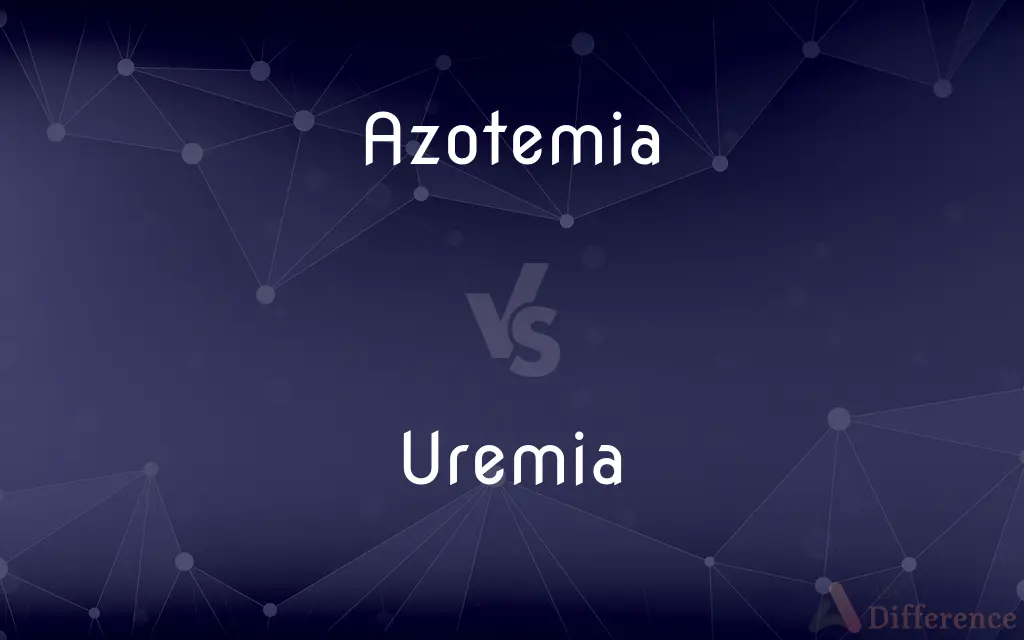Azotemia vs. Uremia — What's the Difference?
Edited by Tayyaba Rehman — By Fiza Rafique — Updated on November 2, 2023
Azotemia is the elevation of blood urea nitrogen (BUN) and creatinine levels; uremia includes azotemia plus clinical symptoms of renal failure.

Difference Between Azotemia and Uremia
Table of Contents
ADVERTISEMENT
Key Differences
Azotemia is a medical condition characterized by abnormally high levels of nitrogen-containing compounds, such as urea and creatinine, in the blood. It is often a result of reduced kidney function but does not always present with symptoms. Azotemia can be categorized into pre-renal, renal, and post-renal, based on the cause of the nitrogenous waste accumulation.
Uremia, on the other hand, signifies a more advanced stage of kidney dysfunction, where the accumulation of urea and other waste products in the blood leads to clinical symptoms. Symptoms of uremia can include nausea, fatigue, confusion, and can be a life-threatening condition requiring urgent medical attention.
Both azotemia and uremia are indicative of kidney problems but differ in severity. Azotemia might be an incidental finding during blood tests when patients are asymptomatic, while uremia almost always involves symptoms due to the body's inability to eliminate waste.
It's crucial to distinguish between azotemia and uremia in clinical practice. While azotemia could be managed with medication and monitoring, uremia typically requires more aggressive treatment such as dialysis or a kidney transplant.
Lastly, azotemia is primarily a laboratory diagnosis, whereas uremia encompasses both the lab abnormalities and the clinical manifestations of renal failure. Proper management of azotemia is critical to prevent progression to uremia.
ADVERTISEMENT
Comparison Chart
Definition
Elevation of nitrogenous wastes in blood
Azotemia with clinical symptoms
Symptoms
Often asymptomatica
Symptoms like nausea, confusion, etc.
Type of Condition
Lab finding
Clinical syndrome
Treatment
Depends on the cause, may include hydration
Often requires dialysis or transplant
Prognosis
Can be reversible with treatment
Indicates severe renal damage
Compare with Definitions
Azotemia
An excess of urea and creatinine in the blood.
Dehydration can sometimes lead to a reversible form of azotemia.
Uremia
The presence of urinary waste in the blood.
The dialysis patient developed uremia when his treatments were delayed.
Azotemia
Accumulation of nitrogenous waste products in the blood.
Post-surgical azotemia is common when patients have prolonged hypotension.
Uremia
Toxic condition from renal failure.
Uremia can cause a condition called uremic frost, where urea crystallizes on the skin.
Azotemia
High nitrogen waste levels in the bloodstream.
The patient's lab tests revealed azotemia, prompting a kidney function evaluation.
Uremia
Severe elevation of waste products causing systemic effects.
The doctor explained that uremia was the cause of his confusion and drowsiness.
Azotemia
Indicative of renal filtration issues.
Azotemia in the elderly often requires careful management due to their reduced renal reserve.
Uremia
Clinical manifestations associated with severe azotemia.
Symptoms of uremia may include lethargy and a metallic taste in the mouth.
Azotemia
Increased blood urea nitrogen (BUN) and serum creatinine.
His blood work showed azotemia, likely caused by his medication's nephrotoxic effects.
Uremia
Systemic symptoms due to kidney dysfunction.
Her progressive uremia was accompanied by decreased urine output.
Azotemia
Azotemia (azot, "nitrogen" + -emia, "blood condition") is a medical condition characterized by abnormally high levels of nitrogen-containing compounds (such as urea, creatinine, various body waste compounds, and other nitrogen-rich compounds) in the blood. It is largely related to insufficient or dysfunctional filtering of blood by the kidneys.
Uremia
Uremia is the condition of having high levels of urea in the blood. Urea is one of the primary components of urine.
Azotemia
See uremia.
Uremia
A toxic condition resulting from kidney disease in which there is retention in the bloodstream of waste products normally excreted in the urine. Also called azotemia.
Azotemia
(pathology) The accumulation in the blood of nitrogen-bearing waste products (such as urea) that are usually excreted in the urine.
Uremia
(pathology) Blood poisoning resulting from the retention of waste products usually excreted as urine.
Azotemia
The accumulation of an abnormally large amount of nitrogen-containing waste products, such as urea, in the blood; uremia.
Uremia
Accumulation in the blood of nitrogen-bearing waste products (urea) that are usually excreted in the urine
Azotemia
Accumulation in the blood of nitrogen-bearing waste products (urea) that are usually excreted in the urine
Common Curiosities
How is azotemia diagnosed?
Azotemia is diagnosed through blood tests measuring BUN and creatinine levels.
What causes uremia?
Uremia is caused by severe kidney failure resulting in symptomatic accumulation of waste products in the body.
How serious is uremia?
Uremia is a serious medical emergency that can be life-threatening without treatment.
Can azotemia lead to uremia?
If left untreated, azotemia can progress to uremia.
What are the symptoms of uremia?
Symptoms include nausea, fatigue, confusion, and sometimes a distinctive breath odor.
Is azotemia treatable?
Azotemia is treatable, often by addressing the underlying cause, like dehydration or heart failure.
What is azotemia?
Azotemia is the buildup of nitrogenous waste products like urea and creatinine in the blood.
Can dehydration cause azotemia?
Yes, dehydration can lead to pre-renal azotemia by reducing blood flow to the kidneys.
Is azotemia always a sign of kidney failure?
Azotemia indicates kidney dysfunction but is not always due to direct kidney failure.
Can uremia affect mental function?
Yes, uremia can lead to confusion and altered mental status.
Does uremia require hospitalization?
Uremia often requires hospitalization and immediate medical treatment.
Does uremia only affect the kidneys?
No, uremia can have systemic effects, impacting various organs and body systems.
What is the difference between pre-renal and renal azotemia?
Pre-renal azotemia is due to factors before the kidney like blood flow, renal is due to kidney damage itself.
Is azotemia reversible?
Azotemia can be reversible, especially if caused by factors like dehydration or medication.
Can diet affect uremia?
Yes, dietary modifications are often part of managing kidney failure to prevent uremia.
Share Your Discovery

Previous Comparison
Cosmology vs. Cosmogony
Next Comparison
Extend vs. ExtensionAuthor Spotlight
Written by
Fiza RafiqueFiza Rafique is a skilled content writer at AskDifference.com, where she meticulously refines and enhances written pieces. Drawing from her vast editorial expertise, Fiza ensures clarity, accuracy, and precision in every article. Passionate about language, she continually seeks to elevate the quality of content for readers worldwide.
Edited by
Tayyaba RehmanTayyaba Rehman is a distinguished writer, currently serving as a primary contributor to askdifference.com. As a researcher in semantics and etymology, Tayyaba's passion for the complexity of languages and their distinctions has found a perfect home on the platform. Tayyaba delves into the intricacies of language, distinguishing between commonly confused words and phrases, thereby providing clarity for readers worldwide.














































